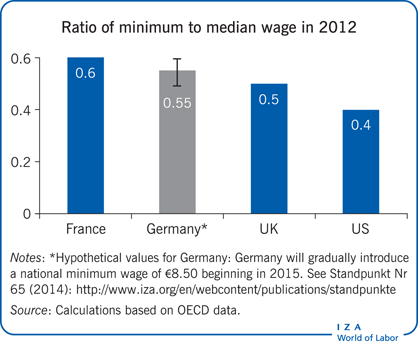Elevator pitch
The potential benefits of higher minimum wages come from the higher wages for affected workers, some of whom are in poor or low-income families. The potential downside is that a higher minimum wage may discourage employers from using the low-wage, low-skill workers that minimum wages are intended to help. If minimum wages reduce employment of low-skill workers, then minimum wages are not a “free lunch” with which to help poor and low-income families, but instead pose a tradeoff of benefits for some versus costs for others. Research findings are not unanimous, but evidence from many countries suggests that minimum wages reduce the jobs available to low-skill workers.

Key findings
Pros
Many low-wage, low-skill workers retain their jobs and earn higher wages when minimum wages are increased.
Some studies do not find that minimum wages lead to fewer jobs.
Living wage policies, adopted by some municipalities in the US, may help reduce poverty.
Targeted tax credits do a better job of reaching the poor than minimum wages do.
Cons
Compelling evidence from many countries indicates that higher minimum wage levels lead to fewer jobs.
Studies that focus on the least-skilled workers find the strongest evidence that minimum wages reduce jobs.
Low-paying jobs requiring low skills are the jobs most likely to decline with increased minimum wages.
In the US, higher minimum wages do not help poor or low-income families.